|
|
|
Sort Order |
|
|
|
Items / Page
|
|
|
|
|
|
|
| Srl | Item |
| 1 |
ID:
087446
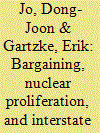

|
|
|
|
|
| Publication |
2009.
|
| Summary/Abstract |
Contrasting claims about the consequences of nuclear weapons rely on different interpretations about how leaders respond to risk, uncertainty, and the balance of power. Nuclear optimists use deterrence theory to argue that proliferation can promote stability and inhibit the use of force. Pessimists argue that proliferation precipitates nuclear hubris, accident, or anger that heightens the risk of war. It is also possible that nuclear weapons have no net effect on dispute propensity. Since states fashion their own bargains, nuclear status is bound to influence the distribution of influence. Proliferation also reflects existing tensions, biasing upward the apparent impact of nuclear weapons on conventional conflict. Instrumenting for the decision to proliferate, the authors find that nuclear weapons increase diplomatic status without much affecting whether states fight.
|
|
|
|
|
|
|
|
|
|
|
|
|
|
|
|
| 2 |
ID:
080824
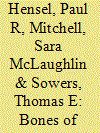

|
|
|
|
|
| Publication |
2008.
|
| Summary/Abstract |
Contentious issues are important sources of militarized conflict. This article advances an issue-based approach to world politics, focusing on disagreements over territory, maritime zones, and cross-border rivers. We characterize militarized conflict and peaceful techniques as substitutable foreign policy tools that states can adopt to resolve disagreements over issues, and we present hypotheses to account for issue management based on issue salience and recent interaction over the same issue. Empirical analyses reveal that states are more likely to use both militarized conflict and peaceful methods when the issue at stake is more salient, both when the general issue type is considered more salient and when the specific issue under contention has greater within-issue salience. Recent issue management also plays an important role, as histories of both militarized conflict and failed peaceful settlements increase pressure to take further action to settle the issue
|
|
|
|
|
|
|
|
|
|
|
|
|
|
|
|
| 3 |
ID:
174721
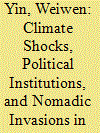

|
|
|
|
|
| Summary/Abstract |
While a large literature argues negative climate shocks can trigger conflicts, recent findings suggest moderate climatic conditions lead to war. This article proposes a conditional theory by incorporating political institution as a moderating variable. I argue that, under the impact of negative climate shocks, centralized societies can mobilize more resources for war, compared to decentralized societies. Thus, the former is more likely to resort to well-organized plundering to address the scarcity problem caused by detrimental climate shocks. Besides, centralized societies have little incentive to plunder when the climatic conditions are moderate, as they can collect taxes regularly through centralized institutions. A comparison between the more centralized Manchurian and the less centralized Mongols on their conflictual behavior serves as an empirical test. I find that temperature was negatively associated with the probability of Manchurian invasion after they embraced centralization but had a positive effect on the likelihood of Mongol invasion.
|
|
|
|
|
|
|
|
|
|
|
|
|
|
|
|
| 4 |
ID:
152418
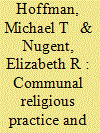

|
|
|
|
|
| Summary/Abstract |
Does religion inevitably promote support for militant politics? Using a new and unique data set compiled from a nationally representative survey in Lebanon, we examine the conditions under which communal religious practice may serve to promote support for or opposition to armed parties. We argue that this relationship, far from being unidirectional and consistent, depends on the interests of the individual sectarian group. For groups engaged in conflict, communal prayer may increase support for arming political parties. For noncombatant groups, however, religion tends to promote opposition to such militarization. Using both observational and experimental evidence, we demonstrate that communal religion increases the salience of group interests through both identity and informational mechanisms. For regular worship attenders, communal religious practice increases the salience of sectarian identity. For nonattenders, informational primes about sectarian interests have the same effect. Among noncombatant groups, this increased salience leads to opposition to armed parties whose presence would threaten the livelihoods and security of those on the sidelines.
|
|
|
|
|
|
|
|
|
|
|
|
|
|
|
|
| 5 |
ID:
177017


|
|
|
|
|
| Summary/Abstract |
Studies of the effect of past actions have focused on yielding without a fight. What happens, however, when states fight and lose? This article assesses the effect of defeat on a state’s behavior and finds that recently defeated states are more likely to initiate disputes than are undefeated or victorious states or states that fight to a draw. This aggression comes at the expense of states responsible for defeat and third-party states uninvolved in the original defeat. The analysis below examines the validity of five potential explanations for postdefeat aggression, including models rooted in failed political objectives, an emotional desire for revenge and reputation-building and finds evidence in support for the latter two. These existing mechanisms fail, however, to explain a key finding—the systematic targeting of weaker, third-party states—which, I argue, is best explained by a desire to bolster the state’s status and confidence in the aftermath of defeat.
|
|
|
|
|
|
|
|
|
|
|
|
|
|
|
|
| 6 |
ID:
119955
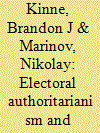

|
|
|
|
|
| Publication |
2013.
|
| Summary/Abstract |
How, if at all, do nondemocratic elections affect credible signaling in international crises? While the literature on credible signaling emphasizes the importance of electoral competition, it does not specify the minimal conditions that elections must satisfy in order to enhance the credibility of threats. We address this oversight by focusing on two fundamental properties of electoral institutions: (1) the degree of proincumbent bias and (2) the vulnerability of the incumbent to a de facto loss of power following an opposition victory. Our theory argues that both decreases in electoral bias and increases in incumbent vulnerability introduce greater accountability into the electoral process and thus enhance the credibility of public threats, even when elections fail to meet basic democratic standards. We apply these insights to the case of electoral authoritarianism, that is, regimes in which some form of electoral competition exists but basic principles of democratic governance are commonly violated. Using data on reciprocation rates in militarized crises, We show that, so long as electoral biases are sufficiently low and incumbent vulnerability is sufficiently high, even electoral authoritarian regimes are able to credibly signal resolve.
|
|
|
|
|
|
|
|
|
|
|
|
|
|
|
|
| 7 |
ID:
159251
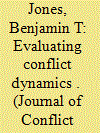

|
|
|
|
|
| Summary/Abstract |
Interest in processes has become increasingly pronounced in international conflict research in recent years, especially how these processes unfold across time “dynamics”. We focus in particular on “stage conceptions” of dynamics: processes that unfold over a series of sequential, and possibly recurrent, stages. We suggest that stage conceptions have two key properties: plurisectality and conditional covariate effects. We propose a novel econometric application to quantitatively assess claims regarding stage conceptions of dynamics: survival modeling. Specifically, we use multistate models to examine how a process evolves through its individual stages, and also whether covariate effects differ across these stages. We use Huth and Allee’s territorial dispute data to demonstrate the importance of conceptualizing conflict as a dynamic process, as well as empirically modeling it as such. We show democracy has different effects on dispute resolution, depending on the dispute’s stage, but that these different effects disappear after time passes.
|
|
|
|
|
|
|
|
|
|
|
|
|
|
|
|
| 8 |
ID:
119229
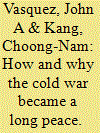

|
|
|
|
|
| Publication |
2013.
|
| Summary/Abstract |
A data-based analysis of how and why the long peace of the Cold War occurred. The analysis tests a proposition originally suggested by Senese and Vasquez (2008) that alliance polarization played an important role in producing the long peace, because in the 1816-1945 and post-Cold War periods, both sides having outside alliances was positively associated with the escalation of a militarized interstate dispute (MID) to war and in the Cold War it was negatively related. New hypotheses are derived to test this claim. Tests of two hypotheses support the claim that alliance polarization played a key role in the long peace, even when controlling for the presence of nuclear weapons.
|
|
|
|
|
|
|
|
|
|
|
|
|
|
|
|
| 9 |
ID:
133273
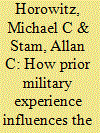

|
|
|
|
|
| Publication |
2014.
|
| Summary/Abstract |
Policy-makers and the electorate assume political executives' life experiences affect their policy choices once in office. Recent international relations work on leaders focuses almost entirely on how political institutions shape leaders' choices rather than on leaders' personal attributes and how they influence policy choices. This article focuses the analytic lens on leaders and their personal backgrounds. We theorize that the prior military background of a leader is an important life experience with direct relevance for how leaders evaluate the utility of using military force. We test several propositions employing a new data set, building on Archigos, that encompasses the life background characteristics of more than 2,500 heads of state from 1875 to 2004. The results show that the leaders most likely to initiate militarized disputes and wars are those with prior military service but no combat experience, as well as former rebels.
|
|
|
|
|
|
|
|
|
|
|
|
|
|
|
|
| 10 |
ID:
177028


|
|
|
|
|
| Summary/Abstract |
Political scientists and policy-makers have long argued that state weakness leads to civil conflict while enhancing state power helps prevent violence. Why, then, has increased state capacity worldwide recently coincided with more civil conflicts? This study argues that enhanced state presence at the sub-national level—a symptom of growing state capacity—may induce violent resistance from the established non-state powers such as local leaders and communities in the short term. Empirically, I conduct two analyses, one at the province level and the other at the ethnic group level. To measure state presence, I use accuracy of census data in the first analysis and global ground transportation data in the second analysis. Results demonstrate that increased state presence triggers civil conflict, particularly in the first five years of such increasing state presence, and this effect is stronger in remote and ethnically heterogeneous regions. Evidence also suggests that ethnic groups settled in peripheral regions are prominent resisters to state penetration. This paper thus expands prior understanding of the role of state power in civil conflicts.
|
|
|
|
|
|
|
|
|
|
|
|
|
|
|
|
| 11 |
ID:
124976


|
|
|
|
|
| Publication |
2013.
|
| Summary/Abstract |
Existing studies of intergovernmental organizations (IGOs) and militarized conflict focus on dyadic counts of shared IGO membership. However, dyadic approaches are inconsistent with the basic properties of IGOs. Because IGOs are multilateral organizations, shared membership necessarily involves ties to third parties. This article employs network analytics to develop a novel explanation of how third-party IGO ties reduce militarized conflict. The analysis first examines the 'structural similarity' of states, defined by the extent to which states share similar patterns of IGO membership with relevant third parties. High levels of structural similarity indicate that states interact with a common set of IGO collaborators. The analysis then shows that micro-level changes in IGO membership effect changes in structural similarity, leading to the macro-level phenomenon of 'network convergence,' wherein states increasingly collaborate with the same third parties over time. Substantively, convergence results in increased overlap and integration between states' respective local networks of IGO partners. Because network convergence is costly, involving a combination of IGO-based accession, sovereignty, and alignment costs, it is unlikely to be pursued by purely exploitative state types. Consequently, convergence provides cooperative types with a mechanism for signaling a preference for cooperation over conflict. These credible signals in turn establish mutual trust among cooperators and effectively reduce the risk of militarized conflict. Extensive empirical analysis shows that, in fact, network convergence strongly correlates with a decline in militarized dispute initiations. The more that states collaborate with one another's IGO partners, the less likely they are to fight.
|
|
|
|
|
|
|
|
|
|
|
|
|
|
|
|
| 12 |
ID:
162439
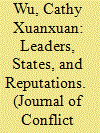

|
|
|
|
|
| Summary/Abstract |
Reputational incentives are ubiquitous explanations for war, yet consistent evidence of their effects is elusive for two reasons. First, most work searches for the payment of reputational costs, yet strategic censoring systematically biases observational data against revealing them. Second, the locus of reputation is often ambiguous, yet the choice of leader or state as unit of observation has inferential consequences. Our research design (a) focuses on observable implications of reputational theories in appropriate samples and (b) considers two competing sources of reputational incentives: changes in national leaders and in political institutions. Consistent with our expectations, leadership turnover and regime change are each associated with initially high probabilities that militarized disputes escalate to the use of force before declining over time in the presence of a reasonable expectation of future disputes. Reputations are in evidence, but analysts must look for them in the right place.
|
|
|
|
|
|
|
|
|
|
|
|
|
|
|
|
| 13 |
ID:
101682
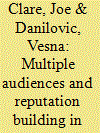

|
|
|
|
|
| Publication |
2010.
|
| Summary/Abstract |
Reputational theory of conflict behavior dates back to Schelling's seminal work on bargaining and continues to find both its advocates and critics to date. The authors do not take sides in this debate about the relevance of reputation for bargaining behavior but rather take a modified approach to reputations for resolve and probe some aspects that were largely underexplored in past research. The authors develop the argument that, if facing multiple strategic rivals and having failed in past disputes, a state has an incentive to invest in its reputation for resolute behavior by initiating and escalating conflicts. Their focus is then on both general and immediate deterrence, and while it was standard to tie reputation to a deterrer's past, the authors direct the attention to the challenger's reputation as a potential motivator for its conflictual behavior. This new focus is validated, and the related expectations supported, in the findings from their empirical analysis of strategic rivalries from 1816 to 1999.
|
|
|
|
|
|
|
|
|
|
|
|
|
|
|
|
| 14 |
ID:
132316
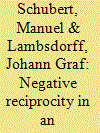

|
|
|
|
|
| Publication |
2014.
|
| Summary/Abstract |
How is negative reciprocity cultivated in an environment of violent conflict? This study investigates how students in the West Bank react to unfair proposals in an ultimatum game. Proposals submitted with Hebrew as compared to Arab handwriting are rejected more often. Israelis must offer 15 percent more of a given stake than Palestinians in order to achieve the same probability of acceptance. This willingness to lose money by rejecting proposals reveals a preference for discrimination against Israelis, cultivated in the conflict-ridden environment. Students who voice a militant attitude, surprisingly, do not reveal a higher tendency to discriminate, exercising a high degree of negative reciprocity toward all unfair proposals. But those who favor a political role for Islam have a higher inclination to discriminate. This implies that ethnic and religious cleavages do not consistently generate in-group solidarity.
|
|
|
|
|
|
|
|
|
|
|
|
|
|
|
|
| 15 |
ID:
162442
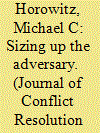

|
|
|
|
|
| Summary/Abstract |
Leaders negotiate, not states. Yet the extensive body of work on coercive diplomacy in international relations pays little attention to variation among leaders. In contrast, we argue that individual-level attributes directly influence leaders’ beliefs about their own military capabilities and, by extension, their selection of disputes. Specifically, leaders with combat experience and careers in national militaries are relatively better judges of their own military power. As a consequence, targets tend to take their threats more seriously. In contrast, leaders who have military careers but lack combat experience tend to be less selective in their demands and correspondingly less successful when they make threats. Similar patterns hold for those with rebel experience. Drawing on new data on leader attributes, we find strong evidence that these leader-level attributes influence both dispute and compellent threat reciprocation. This leader-level approach provides a new explanation for why some countries initiate disputes against determined adversaries who are likely to escalate rather than back down.
|
|
|
|
|
|
|
|
|
|
|
|
|
|
|
|
| 16 |
ID:
133717
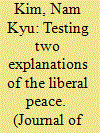

|
|
|
|
|
| Publication |
2014.
|
| Summary/Abstract |
Considerable evidence suggests that economic interdependence and integration reduce the likelihood of militarized conflict. However, scholars have devoted remarkably scant attention to testing different explanations of the liberal peace. This article offers an empirical test that can help adjudicate the two main arguments on the liberal peace: the opportunity cost and signaling arguments. Under the incomplete information assumption, I derive different observable implications of the competing arguments regarding how target states respond when challenged. By estimating selection models comprising dispute initiation and reciprocation, I find that, as challengers are more dependent on bilateral trade, targets are less likely to reciprocate disputes, which is supportive of the signaling argument. Regarding dispute initiation, increases in foreign direct investment and financial openness are associated with a decrease in the probability of conflict initiation. Last, the pacifying effects of the liberal economic variables are much more pronounced in contiguous and major dyads than in other dyads.
|
|
|
|
|
|
|
|
|
|
|
|
|
|
|
|
| 17 |
ID:
156542
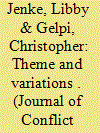

|
|
|
|
|
| Summary/Abstract |
Since its establishment in 1963, the Correlates of War (COW) project has sought to build cumulative knowledge about international conflict through the application of the scientific method to the study of militarized interstate behavior. Early analyses from the COW project found substantial variation in the causal model of war across the nineteenth and twentieth centuries, but COW scholars later sought to develop a general model of war that avoided post hoc historical periodization. We use out of sample cross validation to evaluate the plausibility of assuming temporal homogeneity for statistical models of international conflict that span the nineteenth and twentieth centuries. Our results suggest that the causal model of war changes substantially across historical eras. In particular, great care should be taken in generalizing Cold War findings to other historical eras. Our findings demonstrate the importance of exploring temporal variation in the causal model of war.
|
|
|
|
|
|
|
|
|
|
|
|
|
|
|
|
| 18 |
ID:
142488
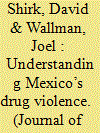

|
|
|
|
|
| Summary/Abstract |
A dramatic increase in criminal violence in Mexico since 2007 has resulted in an estimated 60,000–70,000 “additional” homicides, often of an especially brutal form, related to drug trafficking and other organized-crime activities. This violence has been accompanied by a steep increase in rates of kidnapping and extortion and has targeted participants in the narcotics trade as well as government officials, journalists, and civil society activists. Despite the magnitude of the violence and enormous public concern about it, scholarly literature on this topic has been scant. This issue offers some of the most promising analyses conducted thus far on the trends in violence and their causes, focusing largely, though not exclusively, on the role Mexico’s government has played in the business of illegal drugs and the violence that accompanies it. In this introduction, we discuss the challenge of deriving reliable statistics on drug-related violence, its spatial and temporal patterns, prevailing explanations, its relationship to organized crime in general, and differences between this violence and substate political violence.
|
|
|
|
|
|
|
|
|
|
|
|
|
|
|
|
| 19 |
ID:
145988
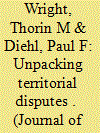

|
|
|
|
|
| Summary/Abstract |
What distinguishes the militarized territorial disputes that escalate to war from those that do not? Although research has clearly established that territorial conflicts are especially war-prone, the understanding as to why this is the case is less developed when compared to domestic factors such as joint democracy. We explain that territorial conflicts are especially war-prone when democratic and autocratic states are engaged in conflict against one another. Because of domestic concerns, democracies and autocracies value territory differently, generating a smaller bargaining space. Democracies will tend to be more resistant to settlement when territory is of a “public,” symbolic, or intangible value. Autocracies, on the other hand, are more likely to value the tangible qualities of territory, such as its resource value. This disparity in territorial goals makes mixed regime dyads more war-prone when territory is disputed. We further believe that the smaller the winning coalition in autocracies, the more war-prone they are against democracies. We test these propositions among all dyads as well as interstate rivals and find support for our theoretical framework.
|
|
|
|
|
|
|
|
|
|
|
|
|
|
|
|
|
|
|
|
|